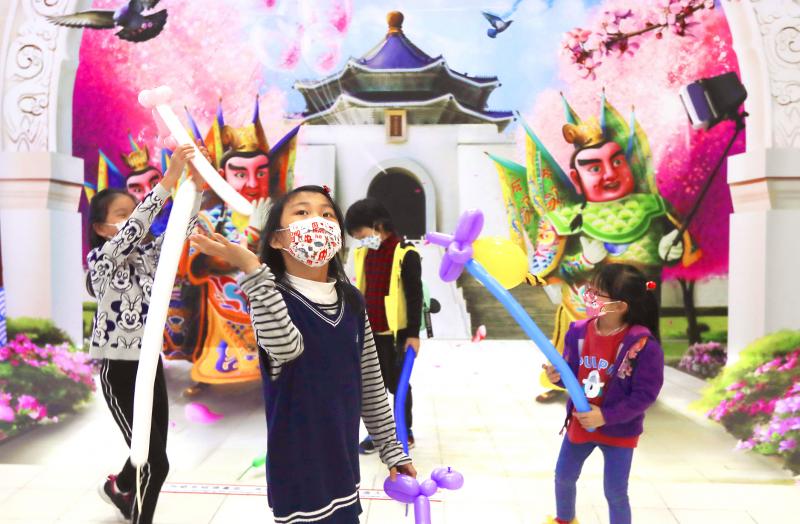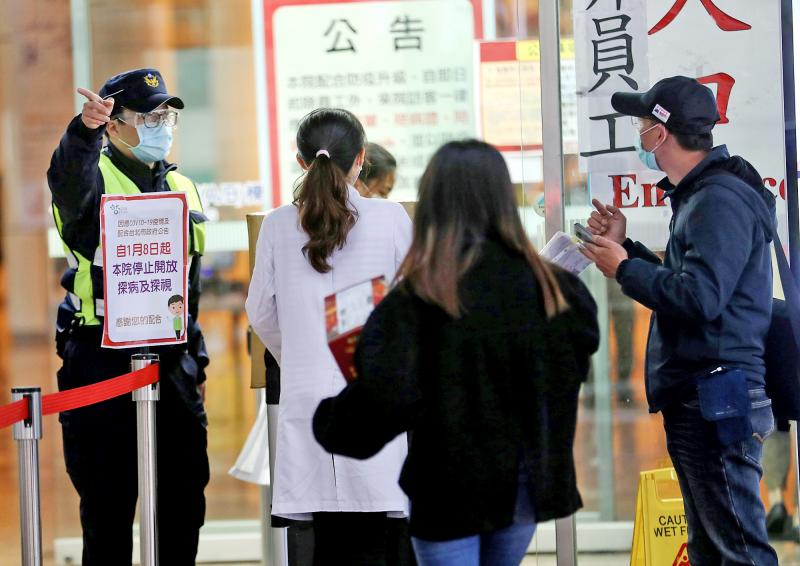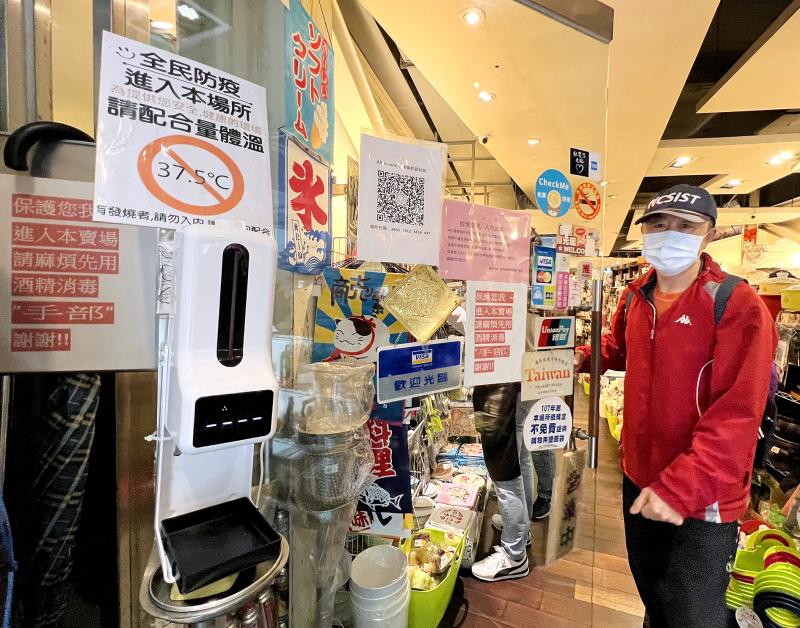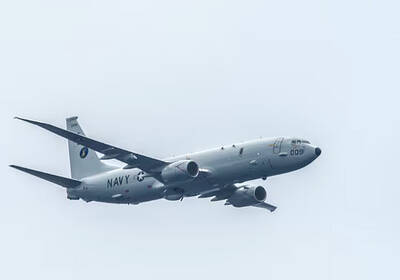The Central Epidemic Command Center (CECC) yesterday announced that a level 2 COVID-19 alert would be extended to Feb. 7, and that tightened visitor restrictions at hospitals and long-term care facilities would be expanded to cover the whole nation, effective immediately.
Minister of Health and Welfare Chen Shih-chung (陳時中), who heads the center, said that domestic restrictions would mostly remain the same, including the extended mask mandate that was implemented on Jan. 9.
As announced on Saturday, drinking and eating are banned on public transport, including buses, trains, boats and domestic flights, he said.

Photo: Chiang Ying-ying, AP
Business and public venues have been asked to strictly implement contact registration, temperature measurements, enhanced cleaning and disinfection, and employee health management, as well as to immediately respond to confirmed cases, he said, adding that retail stores and markets must follow capacity limit guidelines and are banned from offering food samples.
Restaurants are also required to provide handwashing facilities or hand disinfectant, prohibit guests from raising a toast at each table and strictly implement contact registration, Chen said, adding that if they fail to comply with the rules after being fined and asked to improve, they would be banned from offering dine-in services.
Religious venues and gatherings should follow the tightened guidelines announced by the Ministry of the Interior on Saturday, which include strictly observing social distancing indoors and outdoors, he added.

Photo: CNA
For any activity that could attract more than 500 attendees at places of worship, organizers need to present an infection prevention plan that must be approved by their local government, the Ministry of the Interior has said.
After the CECC announced tightened visitor restrictions at hospital and residential long-term care facilities in Taipei, New Taipei City, Taoyuan and Keelung, the rules were expanded to cover the whole nation from yesterday.
“Visiting hospitalized patients is prohibited at all hospitals nationwide, unless under exceptional conditions, and the ... visitors must have a negative result from an antigen or polymerase chain reaction test for COVID-19 within three days of the visit,” Chen said, adding that fully vaccinated visitors can undergo a government-funded test.

Photo: CNA
Before being hospitalized, people who are fully vaccinated can undergo a government-funded test for COVID-19, and each hospital patient can only have one accompanying caregiver, who is also eligible for a government-funded test if they are fully vaccinated, otherwise they must pay for their test weekly, he said.
All healthcare workers in high-risk hospital departments — emergency rooms, intensive care units or those that handle the treatment of suspected or confirmed COVID-19 patients — and who are eligible for a COVID-19 vaccine booster dose, should receive their booster before Tuesday next week, Chen said.
The general rule for visiting long-term care facilities is the same — no visiting is allowed, unless under special circumstances, he said.
New residents must provide a negative COVID-19 test result from within three days of moving in, and restrictions would be placed on them for the first 14 days based on the percentage of vaccinated staff members and residents at the facility, he added.

ROLLER-COASTER RIDE: More than five earthquakes ranging from magnitude 4.4 to 5.5 on the Richter scale shook eastern Taiwan in rapid succession yesterday afternoon Back-to-back weather fronts are forecast to hit Taiwan this week, resulting in rain across the nation in the coming days, the Central Weather Administration said yesterday, as it also warned residents in mountainous regions to be wary of landslides and rockfalls. As the first front approached, sporadic rainfall began in central and northern parts of Taiwan yesterday, the agency said, adding that rain is forecast to intensify in those regions today, while brief showers would also affect other parts of the nation. A second weather system is forecast to arrive on Thursday, bringing additional rain to the whole nation until Sunday, it

CONDITIONAL: The PRC imposes secret requirements that the funding it provides cannot be spent in states with diplomatic relations with Taiwan, Emma Reilly said China has been bribing UN officials to obtain “special benefits” and to block funding from countries that have diplomatic ties with Taiwan, a former UN employee told the British House of Commons on Tuesday. At a House of Commons Foreign Affairs Committee hearing into “international relations within the multilateral system,” former Office of the UN High Commissioner for Human Rights (OHCHR) employee Emma Reilly said in a written statement that “Beijing paid bribes to the two successive Presidents of the [UN] General Assembly” during the two-year negotiation of the Sustainable Development Goals. Another way China exercises influence within the UN Secretariat is

CHINA REACTS: The patrol and reconnaissance plane ‘transited the Taiwan Strait in international airspace,’ the 7th Fleet said, while Taipei said it saw nothing unusual The US 7th Fleet yesterday said that a US Navy P-8A Poseidon flew through the Taiwan Strait, a day after US and Chinese defense heads held their first talks since November 2022 in an effort to reduce regional tensions. The patrol and reconnaissance plane “transited the Taiwan Strait in international airspace,” the 7th Fleet said in a news release. “By operating within the Taiwan Strait in accordance with international law, the United States upholds the navigational rights and freedoms of all nations.” In a separate statement, the Ministry of National Defense said that it monitored nearby waters and airspace as the aircraft

Taiwan’s first drag queen to compete on the internationally acclaimed RuPaul’s Drag Race, Nymphia Wind (妮妃雅), was on Friday crowned the “Next Drag Superstar.” Dressed in a sparkling banana dress, Nymphia Wind swept onto the stage for the final, and stole the show. “Taiwan this is for you,” she said right after show host RuPaul announced her as the winner. “To those who feel like they don’t belong, just remember to live fearlessly and to live their truth,” she said on stage. One of the frontrunners for the past 15 episodes, the 28-year-old breezed through to the final after weeks of showcasing her unique